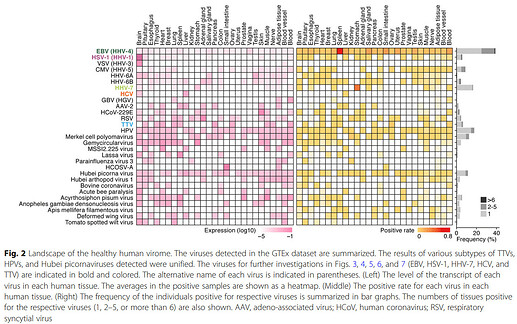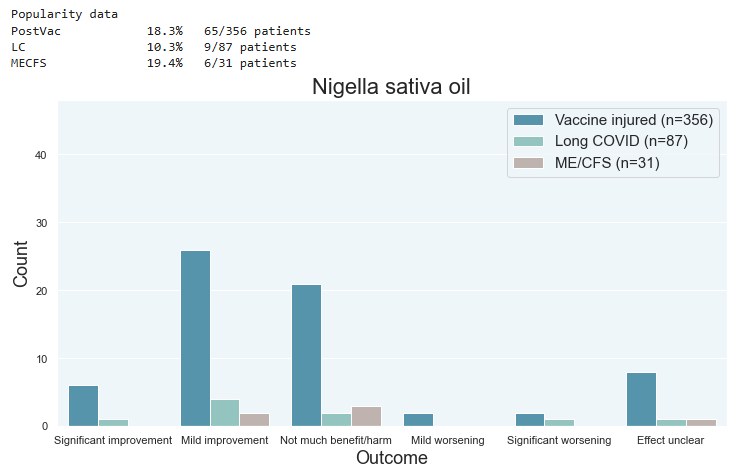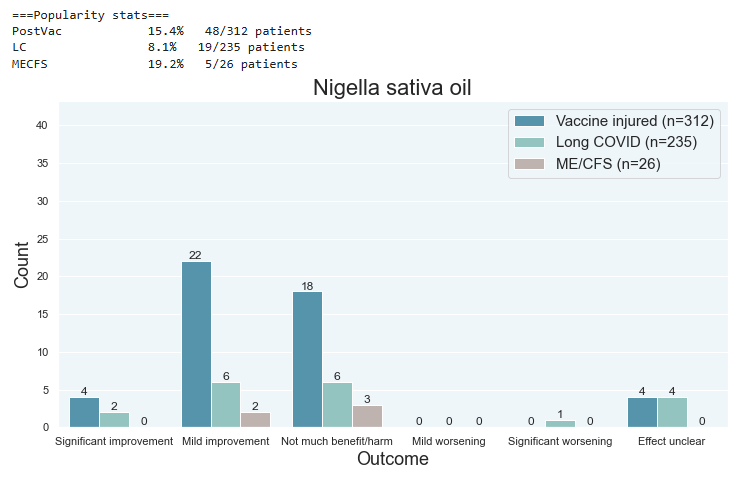The idea is that plants contain antimicrobial chemicals. If you try enough plants by eating flavorful foods, then you may eventually stumble across something that leads to recovery. I’ll discuss my experiences and some theory.
How it works
We know that chemical warfare is an effective way of dealing with bacterial, parasitic, and fungal infections. Antibiotics and antifungal chemicals are the most common way of fighting infections. Doctors no longer use malaria to fight syphilis bacteria (even though it won a Nobel prize)… we use chemicals now.
Plants naturally produce such chemicals. Food scientists know that a plant’s essential oils can be used as food preservatives because they are toxic to bacteria and fungi.
The issue with plants is that most of them produce toxic chemicals against animals that try to eat them. (They also have thorns, spikes, etc.) What I suggest is that patients stick to the foods found at the local supermarket like black seed oil- they are generally considered to be safe for human consumption.
The second insight is that we are wired with instincts about what to eat and when to eat it. Nutritional wisdom is a scientific theory (from biology, psychology, and nutrition) that says animals — including humans — have an innate ability to regulate their diets by instinctively choosing foods that provide the nutrients their bodies need. You can use AI to get an overview of the scientific evidence for it. Or, read the scientific literature yourself.
The idea is that we humans are supposed to eat flavourful food because it does something good for us. It helps us conduct chemical warfare against the bacteria, fungi, and other microorganisms that live inside our tissues such as our brain. They can also contain chemicals that fight biofilms.
Multiple persistent infections - Long Haul Wiki
We should also STOP eating a food when our bodies tell us that it doesn’t taste good.
- We know that our non-food instincts keep us safe. When we fall, we will instinctively put our wrists in front of the fall to break the fall. Our bodies will tell us not to drink too much water because it is possible to die from water poisoning, which can be fatal. Our instincts about food probably keep us safe.
My experiences
I’ve tried a lot of pharmaceutical antimicrobials. It wasn’t that fun because most of them had more side effects than benefit. A few of them were not fun experiences.
Instinctive eating had a much better ratio of good versus bad experiences.
Here’s what I did:
- Go out of my way to try new flavours, e.g. by going to the international foods section of the supermarket. The new set of chemicals may do something that the old food didn’t. This may be how people naturally recover- over time, they will try new foods.
- Listen to my body about what to eat. My staple foods are meat with sauce, and fruit.
- Listen to my body about what NOT to eat. I rarely eat vegetables and grains.
- Track foods and try to avoid the ones that make symptoms worse.
There are a few foods which seem to make an old symptom (anger) come back (tamarind, chocolate; chocolate is fermented+roasted fruit seeds from the cacao plant). My new foods seem to be responsible for many symptoms going down (e.g. PVCs); and they also dealt with health issues that affected me pre-pandemic (fasciculations, exercise recovery / strength). This way of eating was really, really good for my athletic performance.
Evidence
It will likely be really hard to gather reliable data on instinctive eating. Everybody is going to do it differently.
- Ethical eaters may bias themselves towards vegetarian and vegan diets.
- The selection at supermarkets will vary from region to region. (I live in Toronto which is multi-ethnic so there is a lot of food choice.)
- People have different tastes when it comes to food- not everybody likes pineapple or pickles on pizza.
- Not eating vegetables may be a bridge too far for some people.
However, we may be able to get some data as to whether or not this way of eating affects symptoms positively/negatively. Here’s some survey data on black seed oil. People do report some negative experiences with it. While the rate of negative experiences is lower than pharmaceutical drugs, it is surprising that a food found at some Iranian supermarkets may worsen symptoms in some people. The survey data is mildly suggestive of black seed oil being a double edged sword.
Source: Treatment Outcomes Survey
Source: Patient Experiences Survey. see Has anybody tried ___? Here's how you can get answers to that question fast
We also know that some patients report MCAS, food sensitivities, and/or supposed histamine intolerances. This is mildly suggestive of food having an effect on Long COVID, ME/CFS, and vax injury.
*Patients have also tried low histamine diets. On the surveys, patients never reported negative experiences with the low histamine diet.
The potential of this treatment
Compared to pharmaceutical antimicrobials, this is:
- More accessible. You don’t have to do any Dallas Buyer’s Club nonsense (where you find dodgy ways to get access to prescription drugs).
- Contains unique antimicrobials like thymoquinone (found in black seed oil). This may give you a lot of shots on goal in terms of meaningful long haul recovery.
- Likely much safer. We’re talking about supermarket foods here.
However, I wouldn’t say that this treatment is completely safe.
Safety issues
Pharmaceutical drugs are known to interact with supermarket items such as grapefruit (food) and St. John’s Wort (supplement). Some of the chemicals found in food will speed up the metabolism of drugs; others will slow it down. A sudden, drastic change in diet will likely expose you to such chemicals.
We also know that genetics have a strong effect on drug metabolism. You can get your genes sequenced (it’s not that expensive) and have information on how chemicals in food might change how your body metabolizes certain drugs. However, mainstream Western medicine hasn’t really figured out how to make money from this. So, this type of medicine is not popular/offered even though it could exist.
If you are currently on medication (especially antidepressants and other drugs with dangerous withdrawal effects)… I would suggest that you find out what you’re getting yourself into.
In an ideal world, there would be medical professionals (such as genetic counsellors and/or nutritionists) who would look over you and try to keep you out of trouble. But there’s no financial incentive to do good medicine. However, there is a financial incentive to provide ‘treatment’, to put you on drugs, and to keep you on drugs. Don’t expect excellent care in terms of managing food-drug interactions. Don’t expect others to know how to safely get you off a drug.
Minor downsides
This will likely increase your food costs. You should get rid of food that you don’t like.
Microbes as the cause of ME/CFS, Long COVID, etc.
I have a presentation here:
It’s well known that many varieties of microbes live in our bodies. Sometimes, the ecosystem can reach an unhealthy state and cause health problems (you can read the literature on pathobionts for more detail). The diversity of microbes would explain why there isn’t a single cause of ME/CFS or Long COVID. Everybody’s microbiome is different in many ways and similar in others. Our problems stem from the pool of microorganisms that exist- some subset of that lives in our bodies and can potentially cause crippling health problems.
The long haul syndromes are hard to treat because everybody’s microbiome is different. What worked for me probably won’t work for you.
However, with supermarket foods, we can change our microbiome by waging chemical warfare against it. Most importantly, this will likely be one of the safest ways of changing our microbiome. We aren’t trying crazier stuff like ex-soviet bloc antivirals (e.g. tilorone), paxlovid, remdesivir/GS-44, etc. Supermarket foods probably won’t get us into too much trouble.
This way of eating would also expose us to a lot of ‘experimental’ drugs that are probably safe. Plants make a lot of weird chemicals like thymoquinone. (Some plants like hemp/marijuana and kratom make powerful chemicals.) I know that there are a lot of desperate patients out there. This is um… maybe a way of taking desperate measures without taking crazy risks.
Bottom line
I hope that this will turn into a top treatment for long haul because it’s easily accessible, natural, and it should theoretically be very safe. (But maybe it isn’t!) However, there is very little evidence at the moment. Please familiarize yourself with the risks before trying.


